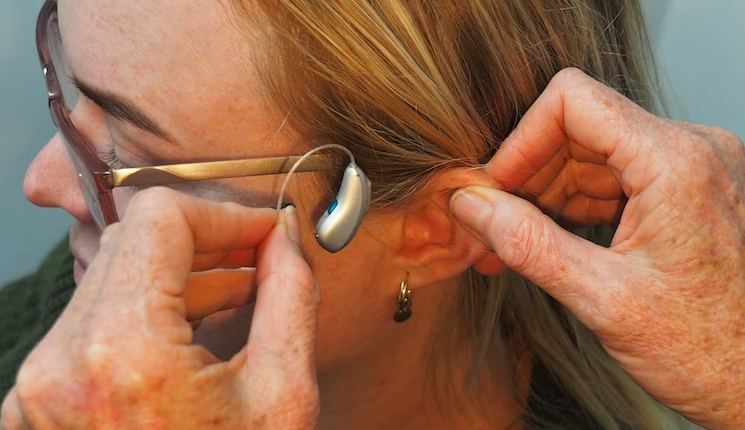Table of Contents
The sense of hearing, just like the other four senses, is a gift that loses its acuity with age. According to John Hopkins Medicine, one in every three people beyond 65 years suffers from hearing loss or presbycusis.
The changes are usually subtle and hard to detect in their early stages. In most cases, the ability to perceive high-pitched sounds, such as the phone’s ringing, gets affected first. However, there are some gender-specific discrepancies when it comes to hearing health.
On average, men are more susceptible to hearing loss when compared to women. An audiogram used to measure hearing acuity in terms of different frequency zones stays flat for both sexes at the age of 20. The same deteriorates at a faster rate for men till the age of 50, after which the rate of deterioration is the same for both genders.
It is also true that women’s hearing ability is better at frequencies above 1000 Hz, and the same is better for men below 1000 Hz. As you keep reading this article, you will discover similar obscure facts about women’s hearing health, some hidden risks involved, and tips to manage your auditory health.
Three Facts about Hearing Every Woman Must Know
1. Women with Hearing Issues are More Likely to be Depressed
According to the American Academy of Audiology, it takes people an average of seven years before people seek help for their hearing health. Because good hearing is closely tied to social interactions, an impaired sense of hearing can significantly impact one’s self-esteem and social life.
Hearing loss can take a toll on the mental health of young adults, especially women. One possible reason could be that women are naturally more relationally driven than men. It usually manifests itself in the form of depression, anxiety, and other mood-related disorders.
2. Drug-Related Hearing Loss Cases are on the Rise
Hearing health is influenced not just by factors like loud music and age, but also by over-the-counter medications, making it important to get a hearing test to monitor changes. These may include simple pain relievers such as Ibuprofen. But the side effects may improve with lower dosages.
One drug that is specifically receiving a lot of negative light is Tepezza or Teprotumumab. This oral medication is usually used to treat a condition called thyroid eye disease.
The National Library of Medicine revealed through its study that while cases of double vision (one of the symptoms of thyroid eye disease) improved, patients treated with Tepezza gradually faced severe hearing problems like tinnitus or permanent hearing loss. The victims of such injuries can file a Tepezza lawsuit to receive suitable compensation.
This lawsuit is currently in its nascent stages. TorHoerman Law attorneys have observed that besides hearing loss and tinnitus, victims with patulous Eustachian tube dysfunction and increased sensitivity in the ears are also coming forward to file this lawsuit.
3. Hearing is Directly Connected to General Health
Did you know that our auditory sense is directly related to more than our sense of balance? It may be related closely to cardiovascular and brain health too. This is because the inner ear, also known as the cochlea region, is so sensitive to blood flow that any problems with cardiovascular and cognitive health can be easily detected there first. And heart disease is the number one killer of women in the US.
Also, diabetes is closely linked to hearing loss. The Centers for Disease Control (CDC) notes that high and low blood sugar levels can lead to nerve damage, even in the ears. This could cause partial or permanent hearing loss.
The Hidden Risks Involved
Among women, the following risk factors can contribute to or escalate the problem of hearing:
- Diabetes can lead to the problem of diabetes cochleopathy, just as it may lead to diabetes retinopathy (a condition affecting the eyes).
- Circulatory diseases such as high blood pressure, heart disease, high cholesterol, etc. may also make the sense of hearing weaker.
- Over-the-counter medications are notorious for causing hearing issues.
- High levels of stress
- A family history of diseases related to the ears
- Gene mutations
Tips to Manage Hearing Health
Here are some practical ways in which you can prevent your hearing health from deteriorating before its time:
- Take special consideration of the risk factors involved. Limit your usage of over-the-counter medications to prevent ototoxicity. Opt for alternative therapies if possible. Also, manage blood sugar and cholesterol levels.
- Never hear loud music, especially with your headset on. In case of loud noises in your vicinity, wear earplugs.
- If you’re someone who parties frequently or visits concerts and other events with loud music, give your ears a break every once in a while.
- Do not use cotton swabs or Q-tips to clear out ear wax as they do more harm than good. Your ear is a self-cleansing organ.
- If you’re into swimming and participate in this activity frequently, ensure your ears are dry. You can use earplugs to prevent water from getting inside your ear. This is because the accumulation of water behind the middle ear can cause hearing loss.
The Takeaway
In general, there are myriads of physiological and psychological differences that exist between the male and the female. The same holds true of the auditory system.
Women usually have a greater sensitivity to sound and shorter latencies, especially at higher frequencies. Hormonal changes may affect hearing abilities. If women maintain a healthy diet full of raw vegetables, fruits, nuts, legumes, and whole grains, they face a lower risk of ever developing hearing loss.
This should also accompany a stress-free lifestyle and regular exercise. These improve hearing ability, cognitive function, and cardiovascular health.


